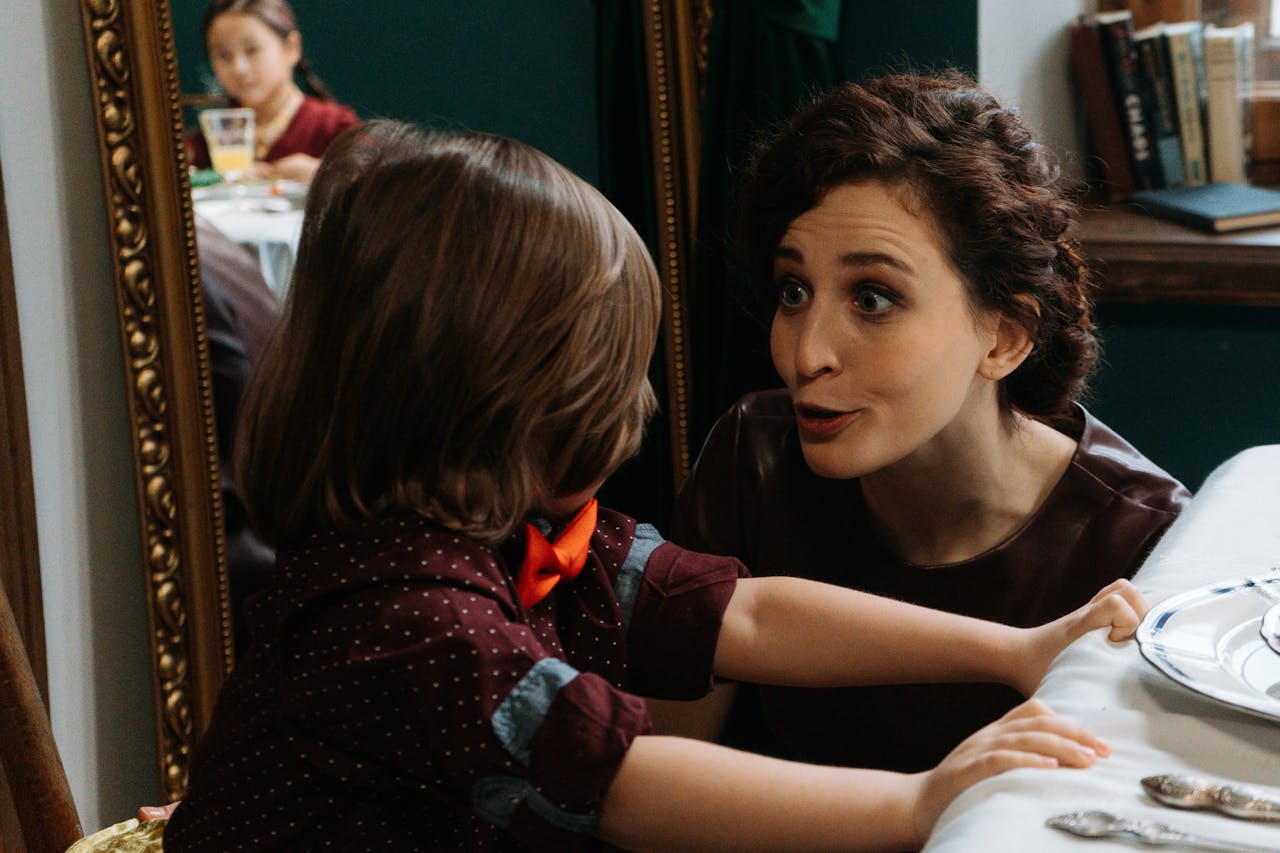12 Strange Rules You Grew Up With That Shaped Who You Are

As children, we were all raised with a variety of rules that seemed strange, unnecessary, or even irritating at the time. However, as we grew older, we began to realize that these seemingly quirky guidelines played a significant role in shaping who we are today. Whether they came from our parents, society, or our culture, these rules helped mold our behavior, attitudes, and even our values. In this blog, we will explore 12 strange rules you likely grew up with that left a lasting impact on your life, helping to shape the person you’ve become.
1. “You Can’t Leave the House Without Your Shoes On”

One of the most common rules many of us grew up with was the idea that you couldn’t leave the house without your shoes on. At the time, this rule might have seemed pointless, especially when we were eager to run outside barefoot. However, this rule taught us the importance of being prepared and presentable at all times. It instilled a sense of readiness for any situation, teaching us that it’s always good to be prepared for whatever the day might bring. It also helped us understand the importance of hygiene and being mindful of where we walk, making sure we were always ready for social situations, even if we didn’t always understand why it mattered.
2. “Don’t Talk Back to Adults”

“Don’t talk back to adults” was a rule that many of us encountered at some point in our childhood. It was meant to teach respect for authority, but it often felt like a way to silence children. While it may have seemed harsh, this rule instilled a deep respect for others, especially those with more experience. It taught us that communication is not just about speaking our minds but also about listening and showing respect to others. Even though it might have stifled some of our natural curiosity or desire to express ourselves, it helped shape our understanding of how to navigate relationships with those in positions of authority.
3. “Finish Everything on Your Plate”

“Finish everything on your plate” is a rule many of us heard at dinner time, and it often felt like a never-ending battle. However, this rule came from a place of wanting to avoid food waste, especially during times when food was less abundant. It taught us the importance of appreciation and not taking things for granted. While it might have led to some uncomfortable moments at the dinner table, it also helped us develop a sense of discipline. It reminded us that sometimes we need to complete tasks, even when they are difficult or unappealing, before we can enjoy the rewards. This lesson has stayed with us, making us more mindful of our resources and appreciative of what we have.
4. “Always Say Please and Thank You”

The rule of saying “please” and “thank you” was one of the first lessons we learned in manners, and it has likely stayed with us for life. While it may have felt like a chore to repeat these phrases constantly, they instilled a sense of politeness and respect for others. This simple rule helped shape our ability to interact with people in a courteous and respectful manner. As we grew older, we began to realize that these small gestures go a long way in creating positive relationships. Saying “please” and “thank you” became second nature, and they remain essential in our everyday interactions.
5. “Never Wear White After Labor Day”

Although this rule may seem outdated today, many of us were taught that wearing white after Labor Day was a fashion faux pas. This strange rule likely shaped our understanding of fashion and social norms, teaching us that there were certain unspoken rules about when and how to wear certain things. While it may have seemed trivial at the time, it reinforced the idea of following trends and societal expectations, even if they didn’t always make sense. Today, we might not follow this rule, but it likely influenced how we approached fashion and the importance of fitting in with the crowd.
6. “You Can’t Go Outside Until You’ve Finished Your Homework”

This rule might have been one of the most dreaded during childhood, but it was essential in teaching us discipline and responsibility. The idea that we couldn’t go outside to play until we finished our homework instilled the importance of prioritizing tasks. It helped us understand that work often comes before play, and that success requires focus and effort. Although it might have felt like a punishment, it helped develop a strong work ethic and a sense of responsibility that we carry into adulthood. The lesson of finishing tasks before enjoying rewards is one that has stayed with us throughout our lives.
7. “Don’t Interrupt People When They’re Talking”

“Don’t interrupt people when they’re talking” was a rule that helped shape our communication skills. While it may have been frustrating at times, especially when we had something important to say, it taught us the value of listening. This rule helped us understand that communication is a two-way street, and that listening is just as important as speaking. It encouraged patience and respect for others’ thoughts and opinions, helping us become more thoughtful and considerate communicators. Over time, we learned that effective communication is about more than just talking—it’s about understanding and respecting others.
8. “You Can’t Have Dessert Until You Finish Your Dinner”

This rule likely felt like a constant battle, but it taught us the value of delayed gratification. The idea that we couldn’t have dessert until we finished our dinner instilled the importance of working for rewards. It showed us that good things often come to those who wait and that hard work and effort are often required before we can enjoy the fruits of our labor. This simple rule helped us develop patience and self-discipline, lessons that have served us well in many areas of life. It also reinforced the idea that rewards should be earned, not given freely.
9. “No Talking at the Dinner Table”

For some families, the rule of no talking at the dinner table was strictly enforced. While it may have felt uncomfortable or awkward at times, it taught us the importance of being present and focused. It encouraged us to savor the moment and appreciate the time spent with family. This rule also helped us develop a sense of mindfulness, teaching us to be aware of our surroundings and the people we are with. Over time, we learned that family meals weren’t just about eating—they were about connecting, sharing, and being present in the moment.
10. “If You Don’t Have Anything Nice to Say, Don’t Say Anything at All”

This rule likely came from a place of wanting to prevent hurtful comments, but it also taught us the value of empathy and kindness. It encouraged us to think before we spoke and to consider the impact our words might have on others. While it may have led to moments of silence in tough situations, it also helped us develop emotional intelligence and the ability to navigate social situations with care. We learned that sometimes, silence is better than speaking harshly, and that kindness and consideration should guide our words.
11. “You Can’t Wear Hats Indoors”

Though this rule might seem trivial today, many of us were taught that wearing hats indoors was disrespectful. It was one of those unspoken rules of etiquette that helped shape our understanding of social norms and appropriate behavior. While we may not always follow this rule now, it taught us about the importance of showing respect in different settings. It also helped us understand the concept of formality and the unspoken rules that govern our interactions in various social situations. Today, we may not think twice about wearing hats indoors, but this rule still shaped our understanding of manners and respect.
12. “Always Carry Cash, Just in Case”

“Always carry cash” was a rule many of us grew up with, passed down by older generations who valued preparedness. While digital payments have largely replaced cash today, this rule taught us the importance of being financially prepared for unexpected situations. Whether it was for emergencies, tips, or small purchases, this rule instilled a sense of responsibility and readiness. It taught us that being prepared financially is just as important as being prepared in other aspects of life. Though cash may no longer be as crucial in today’s world, the lesson of being ready for anything has remained with us.
Final Thoughts

Looking back, these 12 strange rules may have seemed odd or even frustrating at times, but they helped shape us into the people we are today. From teaching us discipline and responsibility to instilling empathy and respect, these rules left a lasting impact on our values and behavior. Even though some of these guidelines may no longer be relevant in today’s world, the lessons they taught us continue to influence how we approach life. So, while you might not remember the exact words of your parents or the exact reason for some of these rules, you can be sure that they played a key role in shaping the person you’ve become.
Leave a Reply